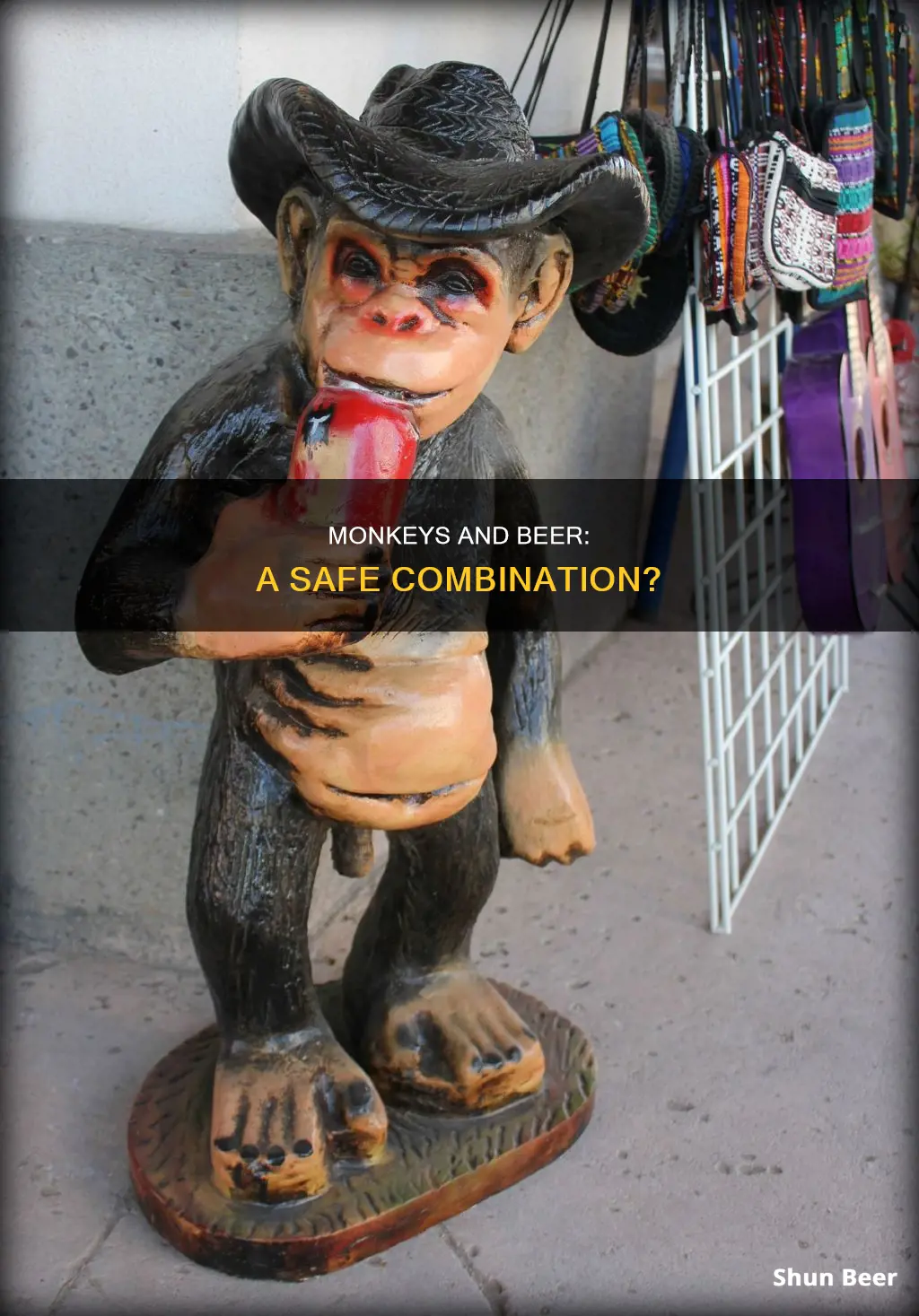
Monkeys have been known to enjoy a tipple or two, with some species even getting drunk. A recent study has shown that the human tendency to drink alcohol may have come from our primate ancestors – this is known as the drunken monkey hypothesis. Fermenting fruit is routinely consumed by spider monkeys, and it is thought that the nutritional benefits of this are what attract the monkeys. Chimpanzees have also been known to raid stocks of palm wine brewed by villagers, and feral vervet monkeys in the Caribbean are famous for stealing alcoholic drinks from bars.
| Characteristics | Values |
|---|---|
| Do monkeys drink alcohol? | Yes, some monkeys have been observed to consume alcohol in the form of fermented fruit. |
| Which monkeys drink alcohol? | Black-handed spider monkeys, chimpanzees, and feral vervet monkeys. |
| Why do monkeys consume alcohol? | The higher calories in fermented fruit provide more energy. |
| Can monkeys get drunk? | Yes, although it is rare. In a 15-month period, black-handed spider monkeys were only observed to get drunk twice. |
| What happens when monkeys get drunk? | They may exhibit behaviours such as vomiting and falling out of trees. |
| Why do humans drink alcohol? | The "drunken monkey hypothesis" suggests that humans inherited their love of alcohol from primate ancestors. |
What You'll Learn

Fermenting fruit in the diet of monkeys
Fermenting fruit is a regular part of the diet of monkeys. Research has shown that monkeys routinely consume fruit containing alcohol. Black-handed spider monkeys in Panama, for example, have been observed eating the mango-like fruits of the jobo tree, which contain alcohol concentrations of between 1% and 2%. This is because the monkeys are attracted to the scent of alcohol, which indicates ripe, fermenting, and nutritious fruit.
The presence of breakdown products of alcohol in their urine demonstrates that they are gaining a calorific benefit from consuming it. The higher calories from the fermented fruit mean more energy for the monkeys. This is supported by the fact that urine samples from the spider monkeys revealed ethanol-specific metabolites, indicating that the alcohol is being digested and utilised for energy, rather than just passing through their bodies.
The "drunken monkey hypothesis", first proposed by Robert Dudley of the University of California at Berkeley, suggests that human attraction to alcohol may derive from the dependence of our primate ancestors on ripe and fermenting fruit as a dominant food source. According to this hypothesis, the attraction to and consumption of ethanol by primates may go back tens of millions of years.
While the preference for fermenting fruit in monkeys is clear, the evidence for whether or not this leads to inebriation in monkeys is mixed. On the one hand, researchers have observed monkeys vomiting and falling out of trees after consuming fruit with higher alcohol content. On the other hand, some researchers argue that the monkeys are probably not getting drunk because their guts fill up before they reach inebriating levels.
Overall, the consumption of fermenting fruit in the diet of monkeys is a well-documented phenomenon that has important implications for our understanding of primate behaviour and evolution, as well as human attraction to alcohol.
Beer and Medrol: Safe Mix or Health Risk?
You may want to see also

The drunken monkey hypothesis
Dudley suggests that the attraction to and consumption of ethanol by various primates may go back tens of millions of years. The light ethanol molecule, produced when yeasts ferment sugars in ripe and overripe fruit, is carried by the wind through vegetation. The odour of ethanol in ripening fruit would have helped primates find scarce calories in tropical rainforests. This once-beneficial attraction to and consumption of ethanol at low concentrations may explain modern human tendencies for alcohol use and abuse.
A new study published in 'Royal Society Open Science' supports this hypothesis. Scientists analysed the ethanol content of fruit eaten by spider monkeys in Panama, finding that it regularly contained alcohol at concentrations of between 1% and 2%. The researchers also collected urine samples, most of which contained secondary metabolites of ethanol, indicating that the monkeys were utilising the alcohol for energy rather than it simply passing through their bodies.
The study's leader, primatologist Christina Campbell of California State University, Northridge (CSUN), commented that "they [the monkeys] would get more calories from fermented fruit than they would from unfermented fruit. The higher calories mean more energy". Campbell also noted that it is not yet known how much alcohol the monkeys are consuming, although it was found to be present in the fruits at concentrations of one to two per cent – comparable to a lager shandy. She observed that "they're not getting drunk on a regular basis... Things that may be beneficial in small amounts can be really bad for you in high quantities. Ethanol is similar to sugar and fat in that respect. It becomes a problem when there's an excess of it".
The idea that humans' natural affinity for alcohol is inherited from our primate ancestors could help society deal with the adverse consequences of alcohol abuse. As Campbell explains, "excessive consumption of alcohol, as with diabetes and obesity, can then be viewed conceptually as a disease of nutritional excess".
Keto and Craft Beer: Is It Possible to Enjoy Both?
You may want to see also

Monkeys and alcohol abuse
Monkeys, like humans, can become alcoholics. Research has shown that their drinking behaviour is remarkably similar to that of humans. In a study, researchers captured 1000 vervet monkeys from St. Kitts island and studied their drinking habits. They found that the monkeys' drinking behaviour could be categorised into four types: social drinkers, regular drinkers, binge drinkers, and teetotallers.
Social drinkers, who made up the majority, preferred their alcohol diluted in fruit juice and only drank in the company of other monkeys. Regular drinkers, who made up 15% of the monkeys, preferred their alcohol "neat" or diluted in water. Interestingly, these monkeys were good leaders and did well in social groups. Binge drinkers, who made up 5% of the monkeys, drank their alcohol fast, got into fights, and drank themselves into a coma. If given unrestricted access to alcohol, they would drink themselves to death within 2-3 months. The remaining 15% of the monkeys were teetotallers, who preferred little to no alcohol.
It is important to note that alcoholism in monkeys, like in humans, can have negative consequences on their health. A longitudinal MRI study found that monkeys that voluntarily and chronically drink alcohol damage their brains, with significant brain volume shrinkage occurring in the cerebral cortices of monkeys drinking high amounts of alcohol. This study provides direct evidence that chronic high-dose alcohol drinking can cause cortical volume loss in non-human primates.
In addition to the health risks, alcohol abuse in monkeys can also lead to social and behavioural problems. For example, alcoholic vervet monkeys in the Caribbean have been known to steal alcoholic drinks from bars and sleeping tourists, leading to property damage.
To address the issue of alcohol abuse in monkeys, some researchers have suggested the use of non-human primate models to study the complex interplay between stress and excessive alcohol consumption. These models can provide valuable insights into the risks and consequences of alcohol use disorders and have been used to study the effects of alcohol on the brain, endocrine system, and behaviour.
Overall, it is clear that monkeys can develop alcohol abuse problems similar to humans and that further research is needed to understand and address this issue effectively.
Beer and Bowel Movements: The Laxative Effect
You may want to see also

The nutritional benefits of ethanol for monkeys
Monkeys have been observed consuming fruit containing ethanol, leading scientists to speculate on the nutritional benefits of this behaviour. This phenomenon has been termed the "drunken monkey hypothesis" and suggests that humans inherited their love of alcohol from their primate ancestors.
Research has shown that wild primates, specifically black-handed spider monkeys in Panama, regularly consume fruit containing alcohol. The fruit in question, known as hog plums or the mango-like fruits of the jobo tree, typically has an alcohol concentration of between 1% and 2% due to natural fermentation by yeasts. This is comparable to a lager shandy and is not enough to cause regular intoxication in the monkeys.
The primary nutritional benefit of ethanol for monkeys is the increased caloric content of fermented fruit compared to unfermented fruit. By consuming fruit containing alcohol, the monkeys obtain more calories, resulting in higher energy levels. This is supported by the presence of breakdown products of alcohol, such as secondary metabolites of ethanol, in their urine. This indicates that the monkeys are metabolizing the alcohol for energy rather than it simply passing through their bodies.
The attraction to ethanol-laden fruit may also be related to the anti-microbial properties of alcohol or the predigestion of the fruit by yeast and other microbes. Additionally, the psychoactive and hedonic effects of ethanol may result in increased consumption rates and, consequently, higher caloric gain.
While the exact amount of alcohol consumed by the monkeys is unknown, it is unlikely that they experience the same inebriating effects as humans. Instead, their consumption of ethanol-containing fruit is driven by the nutritional rewards it provides, including higher caloric content and potential anti-microbial benefits.
In conclusion, the presence of ethanol in ripe fruit offers a nutritional advantage to monkeys, providing them with increased calories and energy. This behaviour may have been inherited by humans from their primate ancestors, influencing our own affinity for alcohol.
The Magic of Beer Fob: How It Works
You may want to see also

Monkeys stealing alcoholic drinks
Monkeys have been known to steal alcoholic drinks from bars and sleeping tourists. Feral vervet monkeys in the Caribbean are famous for this behaviour, and alcoholic monkeys have been observed on the Caribbean island of St. Kitts, where they wait for vacationers to leave their drinks unguarded or unfinished. The monkeys then sneak down from the trees, jump on tables, and start drinking.
Vervet monkeys are a key species for researchers due to their similarities to humans, including their preference for alcohol. Research has been conducted on the drinking habits of vervet monkeys, and it has been found that they exhibit remarkably similar behaviour to humans. The monkeys can be divided into four categories: binge drinkers, regular drinkers, social drinkers, and teetotallers.
Binge drinkers make up 5% of the monkeys, and they drink their alcohol fast, get into fights, and drink until they pass out. Regular drinkers, who make up 15% of the monkeys, prefer their alcohol "neat" or diluted with water, and they tend to be good leaders. The majority of the monkeys are social drinkers, who indulge in alcohol in moderation and only in the company of other monkeys, and never before lunch. The remaining 15% are teetotallers, who prefer little to no alcohol.
The phenomenon of drunk monkeys has become so common that research is being conducted to test the effects of alcohol on primates, with interesting findings related to human alcoholism. For example, a study has found that monkeys, like humans, can become addicted to alcohol, and that this tendency can have a genetic component.
Beer and Nuclear Stress Tests: What's Safe?
You may want to see also
Frequently asked questions
Monkeys have been known to consume alcohol in the form of fermented fruit. However, it is not recommended to give them beer or any other type of alcoholic beverage.
According to researchers, monkeys are attracted to alcohol for the additional calories it provides. The higher calorie content of fermented fruit gives them more energy.
Yes, monkeys can get drunk. In a 15-month period, researchers observed wild monkeys getting drunk twice towards the end of the fruiting season when the alcohol content in the fruit was higher.
When drunk, monkeys have been observed vomiting and falling out of trees.
Excessive alcohol consumption can be harmful to monkeys, just as it is to humans. Additionally, monkeys in captivity do not have the option to choose alternative foods if the alcohol content in their diet becomes too high, which can lead to health issues.







